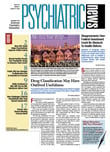First generation or second generation, which is best?
The merits of older antipsychotics versus the newer “atypicals” have been a source of debate, pitting competing claims of efficacy, relative side effects, and cost.
Now a new meta-analysis of research comparing the two classes of drugs suggests a novel resolution to the debate: drop the classification altogether.
“We feel the classification of second generation and first generation is not useful and should be abandoned,” said John Davis, M.D., a coauthor of a report in Lancet published online on December 5, 2008.“ The SGAs [second-generation antipsychotics] are more different from each other than they are similar. When you lump them together, then you get people making generalizations based on whatever property is of interest to them. People interested in cost will say, 'They're all the same; use the cheapest.' People concerned about one sort of side effect will argue for something different from someone concerned about another sort of side effect.”
The meta-analysis looked at 150 double-blind studies comparing nine SGAs with first-generation drugs (FGAs) for overall efficacy; positive, negative, and depressive symptoms; relapse; quality of life; extrapyramidal side effects; weight gain; and sedation.
What Davis and colleagues found was that SGAs differed from each other across almost all of the properties so that in almost no sense could they be considered a homogeneous class.
“Our significant take-home message is that the second-generation drugs have different properties and first-generation drugs, to a lesser degree, also have different properties,” Davis told Psychiatric News. “We feel clinicians should take advantage of the difference in properties to get the best possible result with the fewest side effects, working collaboratively with patients, so one can balance the various properties according to the patients' values as well as the clinicians.'”
Davis is a professor of psychiatry at the University of Illinois School of Medicine.
Davis and colleagues searched the register of the Cochrane Schizophrenia Group and the Food and Drug Administration Web site for randomized controlled trials in which oral formulations of nine SGAs were compared with the FGAs noted below for the treatment of schizophrenia or related disorders between August 2005 and October 2006. The nine SGAs were amisulpride, aripiprazole, clozapine, olanzapine, quetiapine, risperidone, sertindole, ziprasidone, and zotepine.
After exclusion of some studies for various methodological shortcomings, the final analysis looked at 239 publications that included 150 double-blind studies with 21,533 participants. Haloperidol was the comparator drug in 95 studies, chlorpromazine in 28, perphenazine in five, fluphenazine in four, flupenthixol and perazine in three each, thioridazine and levomepromazine in two each, and all other drugs (clopenthixol, zuclopenthixol, mosapramine, thiothixene, clocapramine, trifluoperazine, and periciacine) in one each.
Four of the SGAs—amisulpride, clozapine, olanzapine, and risperidone—were better than FGAs for overall efficacy. The other five were not more efficacious than an FGA, even for negative symptoms; efficacy for negative symptoms has been touted as a defining feature of the atypicals in some pharmaceutical advertising.
All the SGAs were associated with many fewer extrapyramidal side effects than haloperidol. But with the exception of clozapine, olanzapine, and risperidone, SGAs have not been shown to be better than low-potency FGAs.
Amisulpride, clozapine, olanzapine, quetiapine, risperidone, sertindole, and zotepine were associated with significantly more weight gain than was haloperidol, whereas aripiprazole and ziprasidone were not. The SGAs also differed in their sedating properties.
The report broadly confirms the findings of the CATIE study—that drug choice should be tailored to the needs of the individual patient. But it underscores that point by showing that there are almost no defining core components of the class known as SGAs.
“Our meta-analysis gives a summary of advantages and disadvantages of the various drugs, and these drugs differ in many of their properties,” Davis told Psychiatric News. “Therefore, knowing the properties of drugs may allow the clinician to tailor the drug to the given patient. Not all patients experience every side effect, and by carefully choosing a medication, the clinician may get the best efficacy with the minimal side effect for that particular patient.”
An abstract of “Second-Generation Versus First-Generation Antipsychotic Drugs for Schizophrenia: A Meta-Analysis” is posted at<www.thelancet.com/journals/lancet/article/PIIS0140-6736(08)61764-X/abstract>.▪
